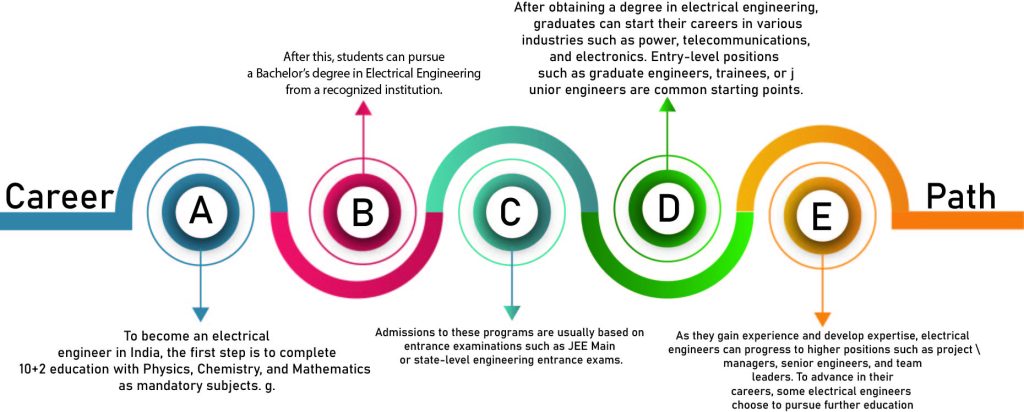Electrical engineering is a field of engineering that deals with the study, design, development, and application of electrical systems and devices. Electrical engineers use their knowledge of mathematics, physics, and other sciences to design and develop new technologies that solve practical problems in society. This field plays a critical role in shaping our modern world, from the power grid that delivers electricity to our homes to the communication systems that allow us to connect with people all over the world.

Work description
The work description of an electrical engineer involves designing, developing, and testing electrical systems and devices.
They use their knowledge of physics, mathematics, and engineering principles to design new products, improve existing ones, and solve complex problems in various industries.
Electrical engineers are also responsible for ensuring that their designs meet safety, efficiency, and performance standards.
They may work on projects related to power generation, transmission, and distribution systems, electronic circuits, telecommunications systems, control systems, and signal processing.
High Demand
High demand for electrical engineers in various industries, including power, telecommunications, and electronics.
Lucrative salaries
Opportunities for career growth and advancement, including management positions.
Opportunities for innovation
High salary potential and job stability.
Versatility
Chance to work on innovative and cutting-edge projects that can have a significant impact on society.
Flexibility
Opportunity to work in a team-oriented environment with other professionals in various fields.
Job satisfaction
Opportunity to work in different countries and cultures.
High stress
Can be mentally and physically demanding, with long hours and tight deadlines.
Long hours
Requires a high level of technical knowledge and skills that must be constantly updated as technology advances.
Competitive field
Can involve working in hazardous environments, such as with high voltage systems.
Constant learning
May require working in remote locations or traveling extensively.
Isolation
Can be highly competitive, with a large number of qualified candidates vying for positions.
Eye strain and other physical health issues
May require continuing education and professional development to remain current with industry trends and technologies.
The cost of pursuing electrical engineering in India varies depending on the institution and the type of program chosen.
Generally, studying at a government-funded institution is more affordable than studying at a private institution. On average, the cost of pursuing a bachelor’s degree in electrical engineering at a government-funded institution in India can range from around INR 50,000 to INR 2 lakhs per year. Private institutions may have higher tuition fees, ranging from INR 2 lakhs to INR 5 lakhs per year.
Additional expenses such as housing, food, books, and transportation must also be considered.
[wpcharts type=”horizontalbarchart” bgcolor=”red:gray:yellow,blue:gray:yellow,random:gray:yellow,purple:gray:yellow” min=”0″ legend=”true” titles=”2 year , 5 year” values=”3,7,5,12″]
The earning potential of an electrical engineer in India depends on several factors such as experience, skills, and industry.
On average, an entry-level electrical engineer can earn a salary of around INR 3-6 lakhs per annum. With experience and expertise, the salary can increase significantly, and a mid-career electrical engineer can earn around INR 10-15 lakhs per annum. Senior-level electrical engineers with more than 10 years of experience can earn salaries of INR 20-30 lakhs per annum or more, depending on their skills and job responsibilities.
The earning potential of electrical engineers in India is influenced by the demand for their skills in various industries such as power, telecommunications, electronics, and manufacturing.
[wpcharts type=”horizontalbarchart” bgcolor=”red:gray:yellow,blue:gray:yellow,random:gray:yellow,purple:gray:yellow” min=”0″ legend=”false” titles=”Entry-Level, Mid-Career, Senior-Level ” values=”5,15,25,35,45,55″]
Strong problem-solving skills and analytical thinking.
Aptitude for mathematics and science.
Ability to think creatively and innovatively.
Strong attention to detail and accuracy.
Good communication and teamwork skills.
Comfortable with using technology and working with computer software.
Strong foundation in math and science.
Poor time management skills and lack of focus.
Weakness in mathematics and science subjects.
Lack of interest in technology or electronics.
Poor communication and teamwork skills.
Difficulty in adapting to new technologies and software.
Lack of motivation and commitment to continuous learning and professional development.
Tendency to procrastinate or miss deadlines.
Work-life balance
The work-life balance of an electrical engineer can vary depending on their job responsibilities and the industry they work in. In general, electrical engineering is a demanding profession that often requires working on complex projects with tight deadlines. This can lead to long hours and working on weekends or holidays to meet project deadlines.
However, many companies offer flexible working hours, allowing electrical engineers to balance their work and personal commitments. Additionally, as electrical engineers gain experience and progress in their careers, they may have more control over their work schedule and workload.

Advancements in electrical engineering have led to the development of new technologies that have transformed society in many ways, such as renewable energy sources and electric vehicles.
Electrical engineers play a critical role in developing innovative solutions to global challenges such as climate change, energy efficiency, and sustainability.
Electrical engineering offers a diverse range of career paths with opportunities for growth, innovation, and professional development.
Electrical engineering careers can be financially rewarding, with the potential for high salaries and job stability.
Power systems engineering
It focuses on the generation, transmission, and distribution of electrical power.
Control systems engineering
It involves designing and developing control systems for various applications, such as robotics, manufacturing, and aerospace.
Electronics engineering
It deals with the design and development of electronic circuits, devices, and systems.
Telecommunications engineering
It involves designing and developing communication systems, such as wireless networks, satellite systems, and broadband systems.
Computer engineering
It combines electrical engineering with computer science to design and develop computer hardware and software systems.
Conclusion:
In conclusion, electrical engineering is a dynamic and rewarding career path that offers opportunities for innovation and professional development. With its broad range of specializations, electrical engineering offers many paths to pursue depending on an individual’s interests and skills. While the profession can be challenging and demanding, it can also be financially rewarding and can contribute to the development of new technologies that have the potential to transform society. Overall, electrical engineering is a promising field for those with a strong interest in technology, mathematics, and science, and a drive to make a positive impact on the world.



